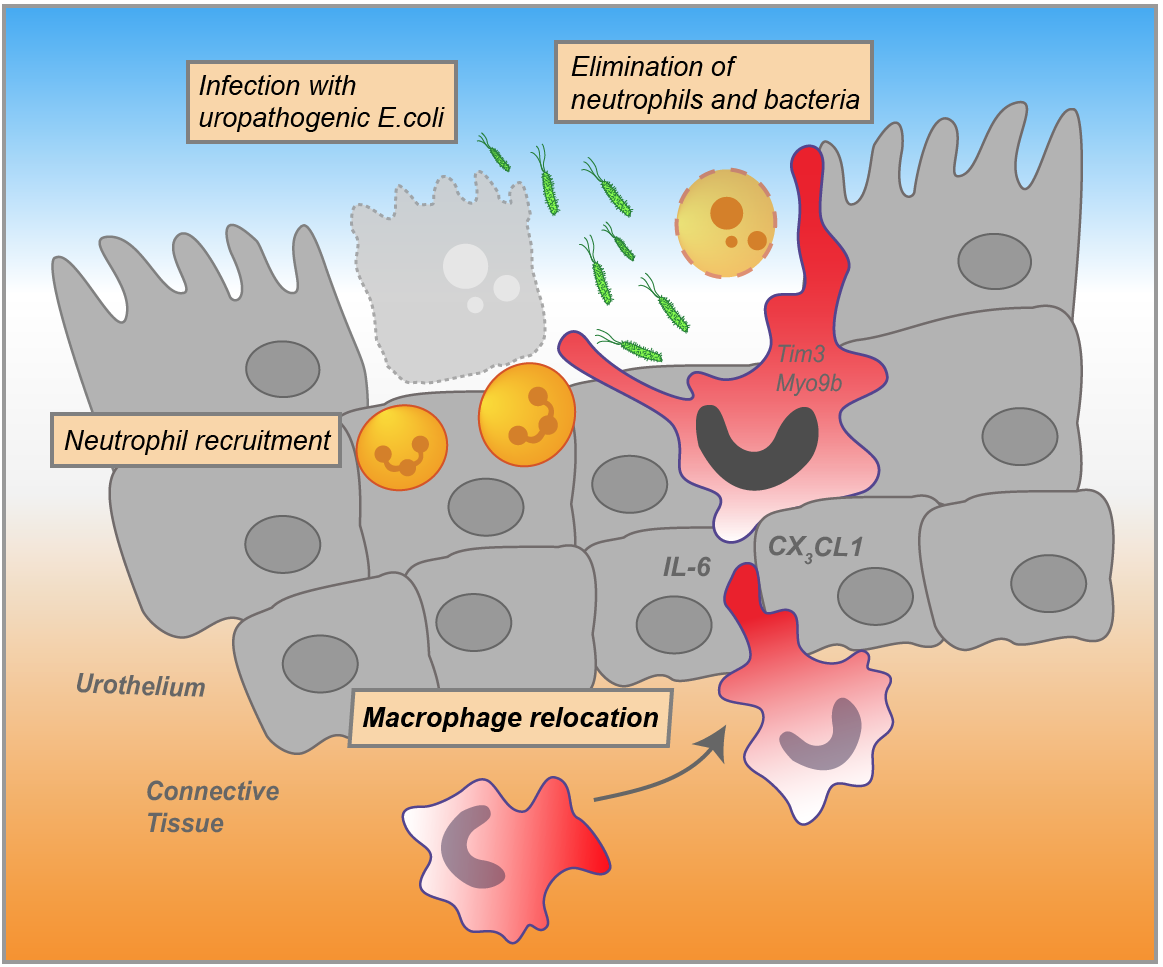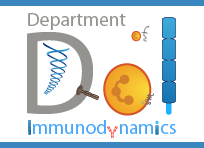Job offers
Job offers at the Department of Immunodynamics
Postdoc for "single cell and spatial multi-omics"
In addition, we regularly offer PhD and PostDoc positions and are very happy to receive unsolicited applications.
Hot Stuff
2023
FOR 5427 (BARICADE) - Immunodynamics receives funding from the German Research Foundation
The German Research Foundation (DFG) is funding an interdisciplinary research group on "Bacterial renal infections and their defense (BARICADE)" (FOR 5427) for the next four years. Our Immunodynamics team is represented with two projects led by Prof. Dr. Daniel R. Engel and Dr. Olga Shevchuk. Using state-of-the-art technologies, such as local mass spectrometry, which allows precise insights at the immunological level, tissue, urine and blood samples from patients with kidney infections are examined immunologically in order to answer open questions and to use the knowledge gained to enable new therapies for patients.
2022
We received funding from the DFG through a Transregional Collaborative Research Center (CRC TRR 332 – Neutrophils: Origin, Fate and Function)
For the next 4 years, the consortium will study neutrophils, the most abundant circulating white blood cell, that have traditionally been considered a homogenous population of terminally differentiated cells with a well-defined and highly conserved function. However, there is emerging evidence over the past ten years that neutrophils exert versatile functions with phenotypic heterogeneity. Far beyond their antimicrobial functions, neutrophils shape the tissue microenvironment during chronic inflammation, tumor development, and homeostasis. This Collaborative Research Centre Transregio 332 brings together experts from three applying universities, the WWU Münster, the LMU Munich, and the University Duisburg-Essen as well as two associated institutions, namely the TU Dresden and the ISAS Leibniz Institute Dortmund, to unravel novel mechanisms for neutrophil biology.
Institute of Experimental Immunology and Imaging: https://www.uni-due.de/experimental-immunology/
Publications
a) Publication in Nature Communications (April 2022)
The publication “Loss of Vascular Endothelial Notch Signaling Promotes Spontaneous Formation of Tertiary Lymphoid Structures” in which the emergence of Tertiary lymphoid structures (TLS) during chronic inflammation in non-lymphoid organs was studied, came out in Nature Communications. Our former PhD Julia Lill contributed with 3D Imaging (Light Sheet Microscopy) to the findings.
b) Review in the European Journal of Endocrinology (March 2022)
Within the framework of the CRC TR296 Locotact – a review on “The interplay of thyroid hormones and the immune system - where we stand and why we need to know about it” was published in the European Journal of Endocrinology. The review deals with the interaction between the immune system and the thyroid gland hormone, a topic that is not yet well understood.
c) Publication in Nature Communications ( January 2022)
In the publication “Progranulin blockade harnesses immune evasion mechanism of pancreatic ductal adenocarcinoma via MHCI restoration” in Nature Communications, we contributed to the study from Jens Siveke from the West German Tumor Center (WTZ) in which the immune evasion of pancreatic cancer was studied. Our former member Camille Soun has supported the findings with bioinformatic image analysis.
New PhD Students
We are welcoming a new PhD student, Lars Borgards, who will be researching on the immunological mechanisms in pyelonephritis. Lars will contribute to the BARICADE project, which was recently funded by the Germany Research Foundation.
Our research group welcomes a new PhD student, Devon Siemes, who is now part of the CRC TR296 Locotact consortium. Devon will use bioinformatics algorithms and systems biology to establish a compendium on the local action of thyroid hormones. This compendium will be generated in collaboration with the Informatics project Z3 with the Principal Investigators Prof. Führer and Dr. Rehwald.
2021
Publications
a) Publication in Kidney International (August 2021)
In August 2021 our paper "Tissue-resident macrophages mediate neutrophil recruitment and kidney injury in shiga toxin-induced hemolytic uremic syndrome", showing activation of tissue-resident macrophages during shiga toxin-producing E.coli-hemolytic uremic syndrome leading to the production of disease-promoting TNFα and CXCR2-dependent recruitment of neutrophils, has been published in Kidney International. This study was headed by our former PhD student Julia K. Lill and we would like to thank all co-authors for their valuable contribution.
b) Publication in Blood Advances (March 2021)
Our paper "Proteomic and bioinformatic profiling of neutrophils in CLL reveals functional defects that predispose to bacterial infetions." dealing with molecular signatures of neutrophils through proteomic, bioinformatic, and functional analyses which are linked to a reduced migratory ability, potentially leading to increased bacterial infections in patients with CLL, has been published in Blood Advances in March 2021. This study was headed by our former PhD student Nirojah Subramaniam and we would like to thank all co-authors for their valuable contribution
DFG grant EN 984/15-1
The hemolytic uremic syndrome (HUS) caused by shiga-toxing (Stx)-producing E.Coli (STEC) is an incurable food borne disease leading to severe health conditions, requiring expensive and life-quality reducing supportive care. After ingestion of contaminated food, STEC colonizes the gut and produce Stx, which traverses into the circulation and damages the microvasculature, particularly in the kidney. There is evidence of a critical role of neutrophils for endothelial damage during STEC-HUS, because increased abundance of these cells is associated with a poor clinical outcome. DFG approved our application "Impact of renal macrophages on endothelial damage and neutrophil activation in hemolytic uremic syndrome induced by shiva toxin-producing E.Coli" in which we aim to unravel the macrophage-specific cellular and molecular mechanisms that control the immune response in STEC-HUS.
Immunodynamics part of the CRC "LocoTact"
Our Immunodynamics group is part of the DFG funded CRC/TR "Local control of TH action" LocoTact and will investigate specifically on "TH transporters in myelin formation and regeneration".
2020
Publication accepted in "Mucosal Immunology"
The renowned journal Mucosal Immunology has accepted our paper "Spatial proteomics revealed a CX3CL1-dependent crosstalk between the urothelium and relocated macrophages through IL-6 during an acute bacterial infection in the urinary bladder" in which our algorithm SPRING (Spatial PRoteome ImagING) revealed the impact and the mechanism of macrophage migration into the infected urothelium during urinary tract infection. SPRING (Spatial PRoteome ImagING) A novel algorithm for correlative mass spectrometry imaging and microscopy which has been developed by our group.
2019
 Proteome (MALDI MSI) study on macrophage relocation available! https://www.biorxiv.org/content/10.1101/649137v1 Congrats to Jenny and Camille: Our algorithm SPRING (Spatial PRoteome ImagING) revealed the impact and the mechanism of macrophage migration into the infected urothelium during urinary tract infection. Highlights
Proteome (MALDI MSI) study on macrophage relocation available! https://www.biorxiv.org/content/10.1101/649137v1 Congrats to Jenny and Camille: Our algorithm SPRING (Spatial PRoteome ImagING) revealed the impact and the mechanism of macrophage migration into the infected urothelium during urinary tract infection. Highlights
1. Macrophages relocate into the urothelium upon infection
2. Spatial expression of Tim3 and Myo9b correlates with macrophage infiltrates
3. A novel algorithm for correlative mass spectrometry imaging and microscopy identifies IL-6–induced CX3CL1 production by urothelial cells as the critical molecule for relocation of macrophages
4. Macrophages maintain urothelial barrier function by elimination of neutrophils and uropathogenic E.coli
Editorial on myeloid cells in EAE In the upcoming issue of the Journal of Leukocyte Biology.
2018
Establishment of Spatial Proteome Imaging in cancer Jenny Bottek and Camille Soun have managed to analyze the proteome on histological sections by MALDI Imaging. We are now starting to measure clinical samples for prediction of therapy resistance and biomarker discovery in cancer. The latest work from the lab is out (Frontline research) in volume 103, issue 1 of Journal of Leukocyte Biology. The study "Proliferation of Ly6C+ monocytes during urinary tract infections is regulated by IL-6 trans-signalling" was headed by our former graduate student Akanksha Dixit, now working in Bonn, and supported by various co-authors. CONGRATULATIONS!
2017
Video of the Immunodynamics group in "Gut"
We are proud to present you with a video which the renowned journal Gut had asked us to produce alongside the paper published recently regarding new findings on POI.
Immunodynamics on Twitter and Facebook
For more up to date info, you can now also follow us on Twitter - twitter.com\drengellab - as well as on Facebook - facebook.com/immunodynamics
Amazing imaging of blood vessels within organs
Have a look at todays amazing imaging possibilities of blood vessels within organs. Such images are being visualized at the Institute for Experimental Immunology and Imaging, Department of Immunodynamics.
LichtscheibenmikroskopieWahnsinn, wie man heute Blutgefäße in Organen sichtbar machen kann #Lichtscheibenmikroskopie . Könnt ihr das Organ erkennen? Solche Aufnahmen entstehen im Institut für Experimentelle Immunologie und Bildgebung, Abteilung Immundynamik http://bit.ly/2A8Wg6F Posted by Universitätsklinikum Essen on Thursday, 2 November 2017
Publication in "JLB"
Our paper dealing with new findings regarding the proliferation of Ly6C+ monocytes was accepted in the Journal of Leukocyte Biology (doi:10.1189/jlb.3HI0517-198R). This study was headed by our former PhD student Akanksha Dixit and we would like to thank all coauthors for their valuable contribution. Please find the whole paper "Proliferation of Ly6C+ monocytes during urinary tract infections is regulated by IL-6 trans-signaling" on our publication section.
Publication in "Gut"
Please find the press announcement (German version) regarding the paper "Irf4-dependent CD103+CD11b+ dendritic cells and the intestinal microbiome regulate monocyte and macrophage activation and intestinal peristalsis in postoperative ileus."
Publication in "Gut"
We are very proud to announce that our paper dealing with new findings regarding the postoperative Ileus was accepted in the renowned journal Gut (doi:10.1136/gutjnl-2017-313856). This study is headed by our PhD student Judith-Mira Pohl and we would like to thank all coauthors for their valuable contribution. Please find the press announcement (German version) regarding the paper "Irf4-dependent CD103+CD11b+ dendritic cells and the intestinal microbiome regulate monocyte and macrophage activation and intestinal peristalsis in postoperative ileus."
Development of SCHNELL
Our Bioinformatic group, Camille, has started to develop SCHNELL, a program to Statistically Compute Histology Networks to Enable Leukocyte Localization.
MALDI Imaging Data in collaboration with the ZeTeM in Bremen
In collaboration with the ZeTeM, we could generate first proteome data on UPEC-infected urinary bladders by MALDI Imaging. This is a first milestone for finding novel biomarkers in this frequent infection.
